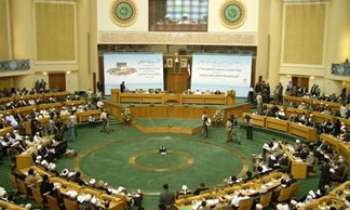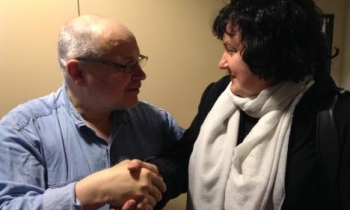News editors around the world are struggling to balance their right to free expression with respect for religious sensitivities as they debate whether to republish controversial cartoons of Prophet Muhammad.
European media are defending the Danish newspaper that first published the images by reprinting them -- unleashing new rounds of fury from offended Muslims. But few media outlets in North America have followed suit.
Editors throughout the Canadian Broadcasting Corporation on Thursday received an e-mail sent on behalf of editor-in-chief Tony Burman warning that CBC News would not show the cartoons "either in a news piece or other ways." The network's senior leadership subsequently decided to stick with the decision.
"We felt that we could explain to our audiences what the images showed without crossing the line," Mr. Burman said in an interview yesterday. "We feel that we're dealing with an intelligent, mature audience that understands our language quite clearly. if there are alternative ways of conveying what the issue is, and in so doing we're not offending many in our audience, then that's the direction that we favour."
The editors' concerns in this case went beyond offending Muslims, Mr. Burman added. "We're also talking about many people who believe that even in a secular society, we should be respectful of important religious symbols and figures."
Only a select few media outlets in Canada dared to reprint any of the controversial cartoons. Le Devoir yesterday published one of the tamer images -- a caricature of Prophet Muhammad with horns -- with a wire story that ran on Page B9. The newspaper wanted to "give our readers an idea of what we were talking about." The cartoon was only three inches high, noted editor-in-chief Jean-Robert Sansfacon.
"Freedom of speech is something that remains fundamental," he said.
"It's a journalistic decision, just like publishing a photograph. We don't want to push self-censorship to the point where we publish nothing, but we also don't want to provoke the crisis."
But many Canadian newspaper editors agreed with the CBC, saying it has not been necessary to publish the cartoons in order to report on the controversy surrounding them. Now that the cartoons have become an issue of their own, there would be an "element of provocation" to reproducing them in a major way, said Andrew Phillips, editor-in-chief of The Gazette in Montreal.
Mr. Phillips said there has not been a major call from readers to publish the images. Montreal has one of the largest Muslim populations in Canada.
Douglas Kelly, editor-in-chief of the National Post, said this newspaper decided not to publish the images after much deliberation.
"On the question of can we run it? Yes, we can. The question is should we run it," Mr. Kelly said. "The depiction of an image in a newspaper is offensive to some readers, and that is of concern."
Most news agencies in the United States have reached the same conclusion -- that the right to free expression must be tempered with respect for their beliefs of their audience. But in so doing, many newspapers have also published editorials supporting the decisions of their European counterparts.
"The cartoons are undeniably offensive to Muslims. Yet the overreaction by opportunistic, authoritarian governments and backpedalling European officials has been deeply disappointing," wrote the Los Angeles Times, which has not reprinted the cartoons.
"It is not necessary to agree with these cartoons to defend another's right to publish them."
Giles Gherson, editor-in-chief of The Toronto Star, pointed out Canadian news outlets may be responding differently because they are operating in a different environment. Religious tensions are not as pronounced here as they are in some European nations.
"There's an interesting question about the nature of our society," he said. "One of the things that marks our society is that we try to be tolerant and we try to understand where members of our society find offence."
Publishing the images would offend readers gratuitously. Written descriptions of what is in the cartoons have sufficed, Mr. Gherson said.









